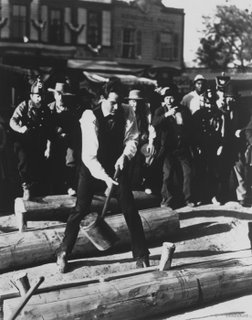
Sunday, October 29, 2006
Man does Henry Fonda look like Abe! Kudos to the costume designer, who looking through the credits appears to be a man named "Royer". I like people with one-name names, like Prince; they just drip with art.
There is a beautiful credit sequence leading us into the movie, where the background is set to a stone finish and the letters of cast and crew names appear like engravings, much like the words engraved on the walls of the Lincoln Memorial. Like that memorial, the film is also a dedication to a piece of American history; not only is it about the life and legend of the late-President's early political years, but it's a trip through American history to the mid-nineteenth century. A parade sequence, in which Lincoln and crowds of people gaze at the spectacle, salutes surviving Revolutionary War veterans and other U.S. historical events and figures. It is a movie hyper-aware of history that uses rhetorical images to convey famous events, a courtesy extended to the legacy of Lincoln as the film progresses.
Ward Bond has a secondary speaking role, though a part much larger than his previous appearances in Ford's films. There is a fantastic vignette sequence that captures events of a county fair taking place the same day as the parade; they are like little chapters that introduce us to Lincoln's versatile, wholesome and likable personality: fair and balanced, he judges a pie eating competition--but the peach and apple pies are both too good to name one superior (and we never do hear Lincoln's verdict in the matter).
 He enters a rail-splitting contest, and of course wins--he is after all a man of the land as much as he is learned lawyer. Finally, he takes part in a tug-o-war competition, but gains an advantage for his team in a not-so-honest fashion (he ties the anchor end of the rope to a cart, but even that sneaky move is done in too much earnest to frown at).
He enters a rail-splitting contest, and of course wins--he is after all a man of the land as much as he is learned lawyer. Finally, he takes part in a tug-o-war competition, but gains an advantage for his team in a not-so-honest fashion (he ties the anchor end of the rope to a cart, but even that sneaky move is done in too much earnest to frown at).As much as the film masters rhetorical images and speeches of Lincoln that always portray him as a pillar of integrity, Lincoln himself uses nonesuch political language speaking among his friends and colleagues.
Take for instance the final courtroom scenes in where the opposing lawyer spews poetic words about America ("this great country" etc.) that doesn't persuade the courtroom, but puts them to sleep (there is a shot of the judge snoring). That lawyer loses the attention of the jury through rhetoric, while Lincoln enraptures them with the plain, simply spoken truth.

Ford really makes Lincoln more of a down-home guy than he does a politician, and his setting embellishes that simple personality. The composition of nature shots at the front and end of the film look painted; the depth and natural detail of the scenes are Romantic in the way of Wordsworth's descriptions of the clouds and sky, sublime. They are idyllic pictures of Lincoln basking in the shade of a tree, the river meandering by; a skilled and cunning man, at one with nature, with a prophetic vision of how American will look tomorrow. That's a dose of the American myth for you.
No comments:
Post a Comment